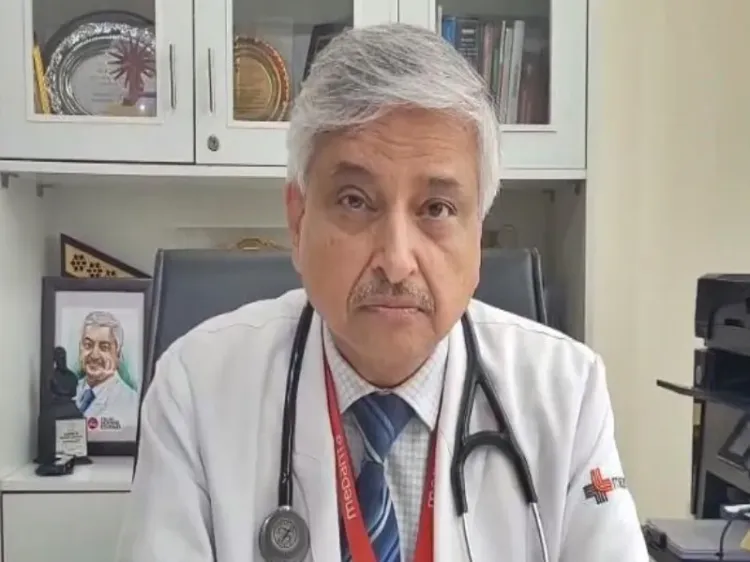Is there really no link between vaccination and sudden cardiac death in youth?

Synopsis
Key Takeaways
- No link between COVID-19 vaccines and sudden cardiac deaths in youth.
- Heart issues are more related to lifestyle choices than vaccination.
- Vaccines have minimal side effects and significant benefits.
- Awareness and healthy living are crucial for heart health.
- Regulation of anti-aging treatments is necessary.
New Delhi, July 4 (NationPress) Former Director of AIIMS, Dr. Randeep Guleria, stated on Friday that recent research conducted by ICMR and AIIMS has definitively indicated that there is no connection between COVID-19 vaccination and sudden cardiac deaths in young individuals.
In an exclusive interview with IANS, he addressed the growing concerns within society regarding heart-related fatalities post-vaccination.
Here are highlights from the discussion:
IANS: The collaborative research by ICMR and AIIMS has determined that there’s no correlation between COVID-19 vaccines and sudden cardiac incidents among youth. What is your take on this finding?
Dr. Randeep Guleria: There has been considerable alarm lately about the deaths of young people due to unexpected heart issues, leading many to speculate if the COVID vaccine could be a factor. However, the studies by ICMR and AIIMS have conclusively demonstrated that there is no such link.
In my experience, we have observed young individuals experiencing heart complications even prior to the COVID pandemic, typically connected to genetic predispositions and significant lifestyle changes.
Our dietary habits have shifted towards unhealthy options; traditional eating patterns rich in green vegetables and fruits have been supplanted by fast food. Additionally, physical activity has diminished, particularly as more youth engage in desk jobs.
This has contributed to weight gain and obesity. Due to these lifestyle choices and genetic factors, heart attacks in our demographic are occurring a decade earlier than in Western nations. Thus, the vaccine is not at fault; the underlying causes differ.
IANS: When did this association between vaccines and heart issues begin? Do vaccines pose any risks to health?
Dr. Randeep Guleria: Every medication, including vaccines, can have certain side effects. However, since vaccines are administered to healthy individuals, their side effects are rigorously monitored.
Dedicated systems are established by the government, WHO, and other organizations to track these effects. Based on this data, the side effects associated with COVID vaccines are minimal, while the benefits are significantly greater.
In fact, India's robust vaccination campaign has played a crucial role in combating COVID-19 effectively. The quick rollout of two vaccines has saved numerous lives. Hence, I would assert that vaccines have been extremely beneficial, not detrimental.
IANS: What about instances where no clear cause of death is identified, particularly when the heart and lungs were functioning well?
Dr. Randeep Guleria: Such occurrences are tragic and concerning. Nonetheless, most are still attributed to lifestyle factors, including poor dietary habits and lack of physical activity. Young people need to enhance their awareness. They should prioritize exercise, healthy eating, and weight management. Returning to our traditional Indian cuisine, rather than opting for Western fast food, is essential.
As I previously mentioned, there is no connection between the COVID vaccine and these fatalities. However, it is true that heart issues among youth are on the rise, and we must engage in open and responsible dialogue regarding this matter.
IANS: What is your perspective on anti-aging treatments? Should they be restricted?
Dr. Randeep Guleria: Anti-aging treatments are gaining popularity, yet they remain largely unregulated. Many of these products are marketed without adequate scientific validation regarding their efficacy. Some may even pose health risks, particularly with prolonged use.
There is a clear necessity to regulate these treatments. If there is insufficient evidence concerning their safety or effectiveness, and they are found to be harmful, then yes, they should be banned. The same is true for other medications, such as those aimed at muscle enhancement that are frequently misused.









